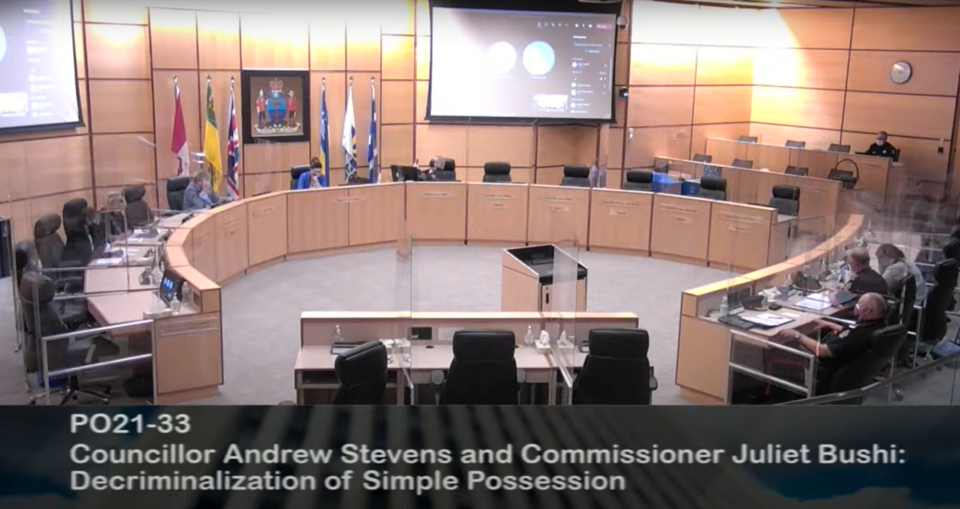REGINA — The process of decriminalizing small drug possession offences has now begun in Regina, after a motion to begin working on a report was discussed at the Police Board of Commissioners meeting on Tuesday.
Councillor Andrew Stevens and Commissioner Juliet Bushi put forth the motion, proposed as an effort to address the rising rates of overdoses seen in Regina as a public health issue related to addictions treatment, rather than a criminal issue.
Data from Regina Police showed that a total of 933 drug overdoses have been recorded in the city since January, with police attending to 174 of those incidents.
The report requested by Stevens and Bushi's motion would evaluate whether decriminalizing possession of small amounts of illicit drugs would be feasible in the city, and what supports would be needed to make the change successful.
As proposed, the motion calls for a look at potential community partners that could aid the shift to viewing drug possession “through a community wellness and public health lens.”
“If this motion passes, I’m really looking forward to having a collaboration, in Regina especially, with different organizations and especially with the people who are most impacted by this,” said Bushi, prior to the board's vote.
The motion also called on assessment into whether making a safe supply of illicit drugs available at safe consumption sites in the city would be beneficial to harm reduction efforts.
Following presentations from public delegates, which included Michael Parker from Regina’s overdose prevention site, the board voted unanimously to pass the motion.
Moving forward, the Regina Police Service will now work with local partners to compile a report assessing the impacts of decriminalizing small possession.
Those named as potential partners include the City of Regina, the Saskatchewan Health Authority, local harm reduction experts, and harm reduction and addictions supports. Indigenous organizations and individuals will also be included in the discussion, said Stevens.
Stevens also noted that this process would work alongside counterparts in Saskatoon, where a similar motion has already passed.
“This wouldn’t be something we would have to go alone,” said Stevens. “We could already partner and share resources under a similar jurisdictional umbrella, with similar stats in terms of who's the most negatively affected by criminalization and addictions in our province.”
Following the report, the next steps would be applying to the federal government seeking approval for localized decriminalization under the Controlled Drugs & Substances Act, said Stevens.
Chief of Police Evan Bray said that police have already been focusing drug investigation efforts on larger trafficking-related charges as of late, rather than simple possession charges.
“Every single night, we have someone in the custody of our officers who possesses an amount of drugs that would qualify for simple possession under the CDSA, and every night, our officers do not lay charges,” said Bray.
Statistics provided during the meeting said that RPS has laid 172 possession charges in 2021, compared to 393 in 2020, said Bray. He also estimated that 2020's numbers were a further decrease from the years prior, as well.
Part of this shift in policing follows a directive from the Public Prosecution of Canada to avoid prosecuting except for the most serious drug-related offences, an initiative which is supported by the Canadian Association of Chiefs of Police.
Both of these positions offer an explanation as to why the number of drug-related charges in Regina have been decreasing, contrary to RPS messaging that illicit drugs remain a rising concern to the community, said Bray.
Bray said he isn’t sure if a move to decriminalize small possession will save the RPS any operational costs in terms of policing efforts, but would offer value as a harm reduction support.
“I do think this is something that is a positive next step for our community,” said Bray. “The report is going to flesh out who we need to engage, and if we do go down this path, we need to know what the implications will be.”
The report is expected to be presented at a public meeting at the beginning of 2022.




